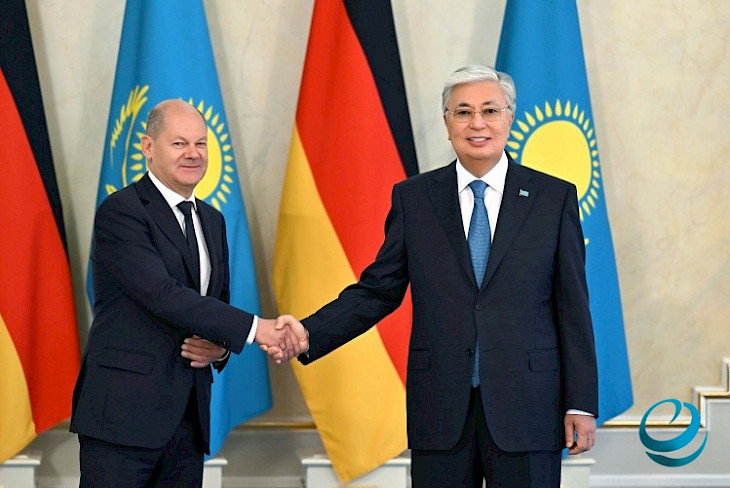The visit of German Chancellor Olaf Scholz to Kazakhstan holds significant symbolic importance in understanding the transformation of global discourses and the positions of Central Asian countries in the context of the war in Ukraine. Eldaniz Guseinov, a specialist in European and international studies, shared his opinion on the visit with Eurasiatoday.ru.
Amid the West's efforts to assert its narratives regarding the conflict, the positions of Central Asian leaders, including Kazakhstan’s President Kassym-Jomart Tokayev, reflect a different perspective, challenging the West's attempts to dominate global issues.
Tokayev's Position: An Unexpected Response to an Unexpected Question from Scholz
Olaf Scholz asked Tokayev to express his position on the war in Ukraine. It is likely that the German leader expected to hear some support for the Western stance—principles of territorial integrity and condemnation of the fighting.
However, Tokayev’s remarks, where he emphasized Russia's "military invincibility" and pointed to the missed opportunity for the Istanbul agreement, showed that the Kazakh leader may view the conflict from another angle.
This statement might surprise the West, as it reflects a widespread opinion: the best solution is not to seek the weakening of Russia at any cost but to achieve a swift ceasefire.
Tokayev proposed supporting China and Brazil's initiatives for a peaceful resolution, which also demonstrates the growing interest of these countries in solving global problems and a shift toward multilateral diplomacy.
Western misinterpretation: Central Asia and Russia's influence
Western analysts may have made a strategic mistake by interpreting the neutrality or non-interference of Central Asian countries in the war as a weakening of Russia's influence in the region.
However, as Scholz's visit to the region and Tokayev's reaction showed, Central Asian countries, despite their desire for a multi-vector foreign policy, are not inclined to sever ties with Russia drastically, with whom they have deep historical and economic connections.
Tokayev clearly stated that Russia remains militarily invincible, and further escalation of the conflict poses a threat not only to the parties involved but also to all of humanity.
This statement symbolizes the position not only of Kazakhstan but of many other countries that seek a swift end to hostilities and diplomatic solutions, rather than an escalation of conflict.
This event sets a precedent for other medium and small powers to increasingly urge the West to pursue a ceasefire, giving the event broader global significance.
The Future of the Germany-Central Asia Format
The reason for these developments may lie in the assessments of German analysts, who may have mistaken their desires (Kazakhstan’s support for the West and the weakening of Russia’s influence) for reality. Such a perception may partly be related to discourses prevalent in the West.
This circumstance could lead to one of the last "Germany-Central Asia" summits in the near future, as there are no prerequisites for institutionalizing this format. The outcomes of the visits to Uzbekistan and Kazakhstan highlight this, even though they were not presented as high-profile visits like those of Macron.
CentralasianLIGHT.org
September 20, 2024

